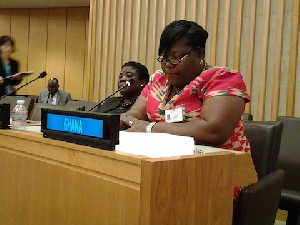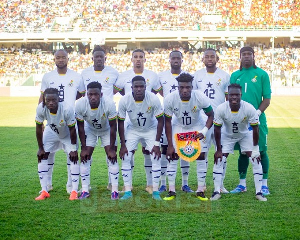The mere existence of witch camps in Ghana blights the country’s human rights record, Minister of Gender, Children and Social Protection, Nana Oye Lithur has said at the national conference on witchcraft accusations and human rights abuses in Ghana.
There are six of such camps in five districts of the Northern Region of Ghana. They are Kukuo, Gnani-Tindang, Gambaga, Bonyase, Tindan-zhie (Kpatinga) and Nabuli in Nanumba South, Yendi, East Mamprusi, Central Gonja and Gushegu districts respectively.
According to the Anti-Witchcraft Allegations Campaign Coalition (AWACC) Field Monitoring, as at May 2012 these witch camps cumulatively remained home to 541 alleged witches, and 503 of their children and grandchildren.
“The issue of witchcraft accusations is one which is deeply complex, extending beyond the issue of witch camps. Undoubtedly witch camps are a blight on our national human rights record but they exist as a symptom of a larger problem,” Lithur said Wednesday. She said witchcraft accusations intersect with mental health and domestic violence issues, as well as issues of poverty, disability and gender inequality.
“We need to work together to develop a national consensus on the underlying issues surrounding the problem with the view of developing a collective national response to witchcraft accusation,” Lithur suggested, adding: “The complexity underlying the problem means we cannot just come up with a single and isolated solution.” “It is instead important that all key stakeholders work together to pursue an integrated, long term, national and inter-sectoral approach. There is the need for a very robust collaboration by all stakeholders here today.
“The development and adoption of a well-co-ordinated multi-disciplinary strategy, backed by real commitment and strong leadership from those present in the room today will ensure that we as a nation can end this shameful dehumanising practice,” the Minister, who is a staunch human rights advocate said.
She said: “It is only when we work together that we will finally be able to properly and comprehensively address a problem of this level of seriousness and complexity. Although it is clear there is still work to be done in the fight against witchcraft accusations, I am proud of our nation’s efforts in combating harmful traditional practices such as this.
Ghana’s constitution enshrines the human rights of all its citizens and is further supported by international laws and conventions to which Ghana is signatory. Legislation including the Criminal Code 1960 (Act 29) which criminalises customary servitude and the Domestic Violence Act 2007, (Act 732) for example, also prohibit negative treatment arising from witchcraft accusations.
Further, recognising that many children and women with mental health issues are at increased risk of accusations; there are expectations that the passage of the Mental Health Act, 2012 (Act 846) on 31st May 2012 will help to address some of the underlying issues surrounding witchcraft accusations.
Section 94 of the Mental Health Act makes it an offence to neglect a person with a mental disability, discriminate against such a person within the terms of the Act or breach any of his or her fundamental rights under any other law. The punishment is a fine of not more than five hundred penalty units or to a term of imprisonment not exceeding 2 years, or both a fine and a term of imprisonment. This sanction applies to persons who operate camps which keep women and all other persons with mental disabilities.
Bodies such as the Commission on Human Rights and Administrative Justice (CHRAJ), the Domestic Violence and Victim Support Unit (DOVVSU) and the National Commission for Civic Education (NCCE) have also been established to enforce human rights in Ghana.
“The Government, recognising the importance of ending witchcraft accusations has been increasingly proactive in addressing the issue of witchcraft accusations in Ghana,” Lithur said.
Regional News of Thursday, 11 December 2014
Source: starrfmonline.com

















